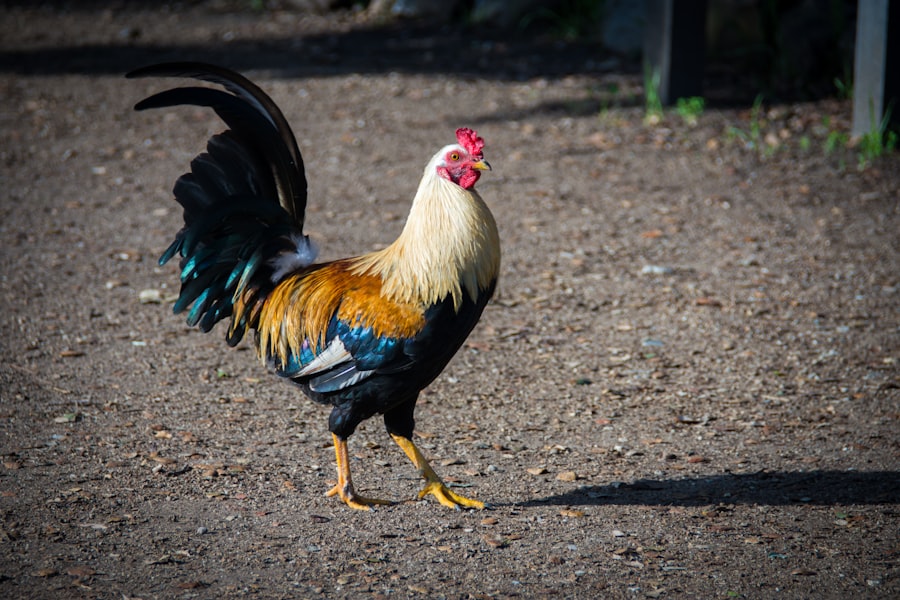Keeping chickens as a hobby or for egg production has become increasingly popular in recent years. Many people are drawn to the idea of having their own fresh eggs and the satisfaction of raising their own chickens. In addition to the practical benefits, such as a constant supply of eggs, there are also numerous other advantages to keeping chickens. They can help control pests in the garden, provide natural fertilizer, and even serve as pets with their unique personalities.
Key Takeaways
- Keeping chickens has numerous benefits, including fresh eggs, natural pest control, and fertilizer for gardens.
- Choosing the right breed of chicken depends on factors such as egg production, temperament, and climate adaptability.
- Building a chicken coop requires careful consideration of size, design, and materials to ensure the safety and comfort of the chickens.
- Feeding and watering chickens requires a balanced diet and clean water, with options for free-range or confined feeding.
- Cleaning and maintaining the chicken coop is essential for preventing disease and ensuring a healthy living environment for the chickens.
Benefits of Keeping Chickens
One of the main benefits of keeping chickens is the nutritional value of fresh eggs. Eggs from backyard chickens are often considered to be superior in taste and quality compared to store-bought eggs. They are also higher in nutrients such as vitamins A, E, and D, as well as omega-3 fatty acids. By having your own chickens, you can ensure that you have a constant supply of fresh, nutritious eggs.
Chickens can also be beneficial for controlling pests in the garden. They love to eat insects, slugs, and other garden pests, which can help reduce the need for chemical pesticides. Chickens will happily scratch and peck at the ground, eating any bugs they come across. This natural pest control can be a great way to keep your garden healthy and thriving.
In addition to their practical benefits, chickens can also provide joy and satisfaction as pets. They have unique personalities and can be quite entertaining to watch. Many people find that spending time with their chickens is a calming and therapeutic experience. Chickens are also relatively low-maintenance pets compared to dogs or cats, making them a great option for those who want the companionship of animals without the same level of commitment.
Choosing the Right Breed of Chicken
When it comes to choosing the right breed of chicken, it is important to consider your specific needs and climate. Different breeds have different characteristics and abilities, so it is important to do your research before making a decision. Some breeds are known for their egg-laying ability, while others are better suited for meat production. Some breeds are more cold-hardy, while others are better suited for hot climates.
It is also important to consider the temperament of the breed. Some breeds are more docile and friendly, while others can be more aggressive or flighty. If you have children or other pets, it is important to choose a breed that is known for being good with them. There are many resources available online and in books that can help you research and select the right breed for your needs.
Building a Chicken Coop
A safe and secure chicken coop is essential for the health and well-being of your chickens. It provides them with shelter from the elements, protection from predators, and a place to lay their eggs. When building a chicken coop, it is important to use high-quality materials that will withstand the elements and keep your chickens safe.
Basic materials needed for building a chicken coop include lumber, hardware cloth, screws or nails, and roofing materials. You will also need basic tools such as a saw, drill, and hammer. It is important to follow a set of plans or designs when building your coop to ensure that it meets the needs of your flock and provides adequate space and ventilation.
There are many resources available online where you can find coop plans and designs. These resources often include step-by-step instructions and diagrams to help you build your coop. It is important to choose a design that fits your specific needs and space constraints.
Size and Design of Chicken Coop
The size and design of your chicken coop will depend on the number of chickens you plan to keep and the space available to you. It is important to provide enough space for your chickens to move around comfortably and engage in natural behaviors such as scratching and perching.
A general rule of thumb is to provide at least 4 square feet of coop space per chicken. This will ensure that they have enough room to move around and avoid overcrowding. It is also important to provide adequate ventilation and natural light in the coop. Good ventilation will help prevent the buildup of moisture and ammonia, which can lead to respiratory issues in chickens.
In addition to the coop space, you will also need to provide an outdoor run area for your chickens. This should be securely fenced to protect them from predators. The run area should also provide access to fresh grass and dirt for scratching and foraging.
To maximize space and minimize waste, consider adding features such as nesting boxes that can be accessed from outside the coop, as well as removable roosting bars that can be easily cleaned. It is also important to regularly clean and maintain the coop to ensure the health of your chickens.
Feeding and Watering Chickens

Proper nutrition is essential for the health and productivity of your chickens. Chickens require a balanced diet that includes a combination of grains, protein, vitamins, and minerals. There are many commercially available chicken feeds on the market that are specifically formulated for different stages of a chicken’s life.
In addition to commercial feed, chickens also enjoy a variety of kitchen scraps and garden leftovers. They can eat fruits, vegetables, grains, and even meat scraps. It is important to avoid feeding them anything toxic or harmful, such as chocolate or onions.
Clean water is also essential for the health of your chickens. Chickens require fresh water daily, especially during hot weather. It is important to provide water in a clean container that is easily accessible to your chickens. Regularly cleaning and refilling the water container will help prevent the buildup of bacteria and algae.
Cleaning and Maintaining the Chicken Coop
Regular cleaning and maintenance of the chicken coop is essential for the health of your chickens. A dirty coop can lead to a buildup of bacteria, mold, and parasites, which can cause respiratory issues and other health problems in chickens.
It is important to regularly remove soiled bedding and replace it with fresh bedding. This will help keep the coop clean and dry. It is also important to regularly clean and disinfect the nesting boxes and roosting bars to prevent the buildup of bacteria.
Managing waste is also an important part of maintaining a clean coop. Chicken manure can be a valuable source of fertilizer for your garden, but it needs to be properly managed to prevent odors and flies. Regularly turning the manure pile and adding carbon-rich materials such as straw or wood shavings can help control odors and speed up the composting process.
Protecting Chickens from Predators
Predators can pose a significant threat to backyard chickens, so it is important to take steps to protect them. Common predators include raccoons, foxes, coyotes, dogs, and even birds of prey. It is important to secure the coop and run area to prevent predators from gaining access.
To protect against ground predators such as raccoons and foxes, it is important to bury hardware cloth around the perimeter of the coop and run area. This will prevent predators from digging under the fence. It is also important to secure any openings or gaps in the coop that predators could squeeze through.
Birds of prey can be deterred by covering the run area with netting or wire mesh. This will prevent them from swooping down and grabbing your chickens. It is also important to provide your chickens with a secure place to hide, such as a covered area or dense shrubbery.
Health and Wellness of Chickens
Monitoring the health of your chickens is essential for catching any potential issues early on. It is important to regularly check your chickens for signs of illness or injury. Common signs of illness include lethargy, loss of appetite, abnormal droppings, and respiratory issues. If you notice any of these signs, it is important to seek veterinary care as soon as possible.
Preventing common chicken health issues is also important. This can be done by providing a clean and dry environment, feeding a balanced diet, and practicing good biosecurity measures. It is also important to regularly check your chickens for external parasites such as mites or lice. These can be treated with appropriate medications or natural remedies.
Conclusion and Additional Resources
Keeping chickens can be a rewarding and fulfilling hobby or source of fresh eggs. It provides numerous benefits, including fresh eggs, natural pest control, and the joy of raising pets. However, it also requires a commitment to providing proper care and maintenance for your chickens.
There are many resources available for learning more about backyard chicken keeping. Books, websites, and online forums can provide valuable information and advice from experienced chicken keepers. It is also important to connect with other chicken keepers in your community to share experiences and tips.
In conclusion, keeping chickens can be a wonderful addition to your backyard. It provides numerous benefits and can be a rewarding and educational experience. By following proper care and maintenance practices, you can ensure the health and well-being of your chickens while enjoying the many benefits they provide.
If you’re interested in keeping chickens, you’ll definitely want to check out this informative article on chicken coop interior ideas. It offers great tips and inspiration for creating a comfortable and functional living space for your feathered friends. And while you’re at it, don’t forget to read up on how to insulate a chicken coop to ensure your chickens stay warm and cozy during the colder months. For those looking to expand their flock, there’s also a helpful article on when guinea fowl lay eggs. Happy reading! (source)
FAQs
What are the benefits of keeping chickens?
Keeping chickens can provide a source of fresh eggs, fertilizer for gardens, and entertainment. They also help control pests and weeds in the yard.
What do chickens need to be healthy?
Chickens need access to clean water, a balanced diet, shelter from the elements, and protection from predators. They also need space to move around and exercise.
What should I feed my chickens?
Chickens need a balanced diet that includes protein, carbohydrates, vitamins, and minerals. Commercial chicken feed is available at most feed stores and can be supplemented with fresh fruits and vegetables.
How often do I need to clean the chicken coop?
The chicken coop should be cleaned at least once a week to prevent the buildup of feces and bacteria. The frequency of cleaning may need to be increased depending on the number of chickens and the size of the coop.
What are some common health problems in chickens?
Common health problems in chickens include respiratory infections, mites and lice, and egg-laying issues. It is important to monitor your chickens for any signs of illness and seek veterinary care if necessary.
Do I need a rooster to have eggs?
No, a rooster is not necessary for hens to lay eggs. Hens will lay eggs regardless of whether or not there is a rooster present. However, if you want fertilized eggs to hatch into chicks, you will need a rooster.
Meet Walter, the feathered-friend fanatic of Florida! Nestled in the sunshine state, Walter struts through life with his feathered companions, clucking his way to happiness. With a coop that’s fancier than a five-star hotel, he’s the Don Juan of the chicken world. When he’s not teaching his hens to do the cha-cha, you’ll find him in a heated debate with his prized rooster, Sir Clucks-a-Lot. Walter’s poultry passion is no yolk; he’s the sunny-side-up guy you never knew you needed in your flock of friends!







